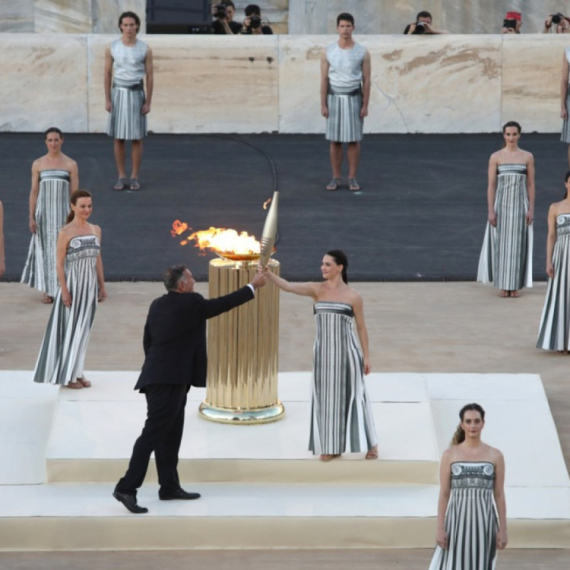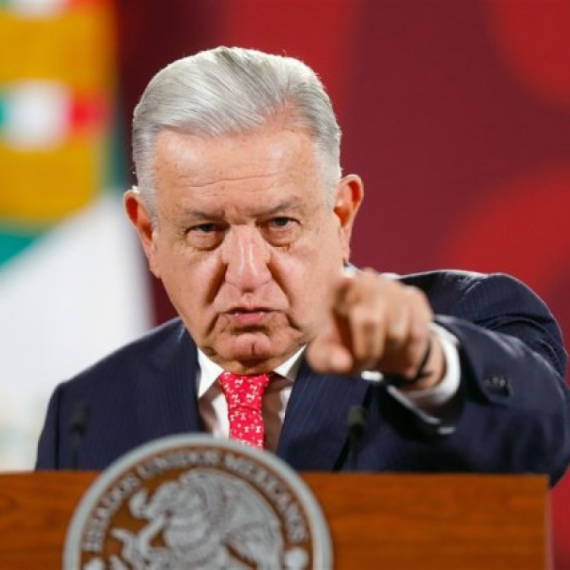BP says capped oil well not leaking
BP says there are no signs of leakage from its ruptured oil well in the Gulf of Mexico, a day after the flow was stopped for the first time since April.
Saturday, 17.07.2010.
10:16

BP says there are no signs of leakage from its ruptured oil well in the Gulf of Mexico, a day after the flow was stopped for the first time since April. No oil has escaped from the new cap sealing the well and there was no sign of any breach under the sea floor, BP executive Kent Wells said. BP says capped oil well not leaking However, more pressure testing is being done to check there are no ruptures. Earlier, the U.S. official overseeing the spill response, Admiral Thad Allen, said the latest tests were inconclusive. Adm Allen said the pressure test of the well would continue for several more hours. Speaking in Washington on Friday, U.S. President Barack Obama cautioned against over-optimism and said much work remained to be done. "It is important we don't get ahead of ourselves," he said. "One of the problems with having this camera down there is, is that when the oil stops gushing, everybody feels like we're done - and we're not." A new cap was used on Thursday to stop the flow for the first time since April 20, as part of a 48-hour test of the well's integrity. Eleven workers were killed in the Deepwater Horizon explosion, and the oil spill has caused an environmental catastrophe, killing wildlife and coating fragile coastal marshlands with thick, brown crude. Spilled oil has affected hundreds of miles of Gulf coastline since April, with serious economic damage to the region as tourists have avoided Gulf Coast beaches and fishing grounds have remained closed. BP has already paid out more than usd 200mn to 32,000 claimants. The company is evaluating a further 17,000 for payment and is seeking more information on 61,000 other claims. High pressure On the sea floor, robotic cameras and monitoring instruments currently show no evidence of the well rupturing. If the pressure within the new cap on the well stays high, it could mean there are no other leaks or ruptures within the well bore. If it drops, that could suggest problems. BP scientists have detected "no negative evidence of any breaching" of the sea floor, Wells said. The company will soon run another seismic survey to check for any evidence of ruptures. BP and government experts are reviewing results every six hours. If the test is successful, it is not clear what will happen next. BP has suggested it might be possible to keep the well shut, with oil collection vessels left on standby. Adm Allen has suggested the most likely outcome is the resumption of collection of the oil with four vessels and the capacity to collect 80,000 barrels - all or virtually all of the oil - each day. BP is also resuming work on a relief well that has 30ft left to drill before it hits the original leaking well. Once the wells intersect, mud and cement will be used to permanently deal with the leak.
BP says capped oil well not leaking
However, more pressure testing is being done to check there are no ruptures.Earlier, the U.S. official overseeing the spill response, Admiral Thad Allen, said the latest tests were inconclusive.
Adm Allen said the pressure test of the well would continue for several more hours.
Speaking in Washington on Friday, U.S. President Barack Obama cautioned against over-optimism and said much work remained to be done.
"It is important we don't get ahead of ourselves," he said.
"One of the problems with having this camera down there is, is that when the oil stops gushing, everybody feels like we're done - and we're not."
A new cap was used on Thursday to stop the flow for the first time since April 20, as part of a 48-hour test of the well's integrity.
Eleven workers were killed in the Deepwater Horizon explosion, and the oil spill has caused an environmental catastrophe, killing wildlife and coating fragile coastal marshlands with thick, brown crude.
Spilled oil has affected hundreds of miles of Gulf coastline since April, with serious economic damage to the region as tourists have avoided Gulf Coast beaches and fishing grounds have remained closed.
BP has already paid out more than usd 200mn to 32,000 claimants. The company is evaluating a further 17,000 for payment and is seeking more information on 61,000 other claims.
High pressure
On the sea floor, robotic cameras and monitoring instruments currently show no evidence of the well rupturing.If the pressure within the new cap on the well stays high, it could mean there are no other leaks or ruptures within the well bore. If it drops, that could suggest problems.
BP scientists have detected "no negative evidence of any breaching" of the sea floor, Wells said. The company will soon run another seismic survey to check for any evidence of ruptures.
BP and government experts are reviewing results every six hours. If the test is successful, it is not clear what will happen next. BP has suggested it might be possible to keep the well shut, with oil collection vessels left on standby.
Adm Allen has suggested the most likely outcome is the resumption of collection of the oil with four vessels and the capacity to collect 80,000 barrels - all or virtually all of the oil - each day.
BP is also resuming work on a relief well that has 30ft left to drill before it hits the original leaking well. Once the wells intersect, mud and cement will be used to permanently deal with the leak.









































Komentari 0